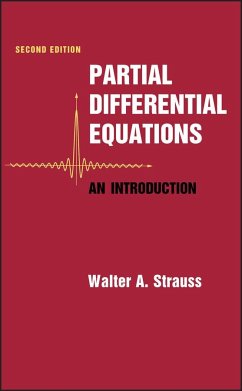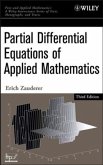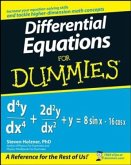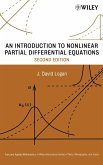- Gebundenes Buch
- Merkliste
- Auf die Merkliste
- Bewerten Bewerten
- Teilen
- Produkt teilen
- Produkterinnerung
- Produkterinnerung
Our understanding of the fundamental processes of the natural world is based to a large extent on partial differential equations (PDEs). The second edition of Partial Differential Equations provides an introduction to the basic properties of PDEs and the ideas and techniques that have proven useful in analyzing them. It provides the student a broad perspective on the subject, illustrates the incredibly rich variety of phenomena encompassed by it, and imparts a working knowledge of the most important techniques of analysis of the solutions of the equations.
In this book mathematical jargon…mehr
Andere Kunden interessierten sich auch für
![Partial Differential Equations and the Finite Element Method Partial Differential Equations and the Finite Element Method]() Pavel SolínPartial Differential Equations and the Finite Element Method189,99 €
Pavel SolínPartial Differential Equations and the Finite Element Method189,99 €![Fourier Series and PDEs Fourier Series and PDEs]() Richard BernatzFourier Series and PDEs119,99 €
Richard BernatzFourier Series and PDEs119,99 €![Partial Differential Equations of Applied Mathematics Partial Differential Equations of Applied Mathematics]() Erich ZaudererPartial Differential Equations of Applied Mathematics184,99 €
Erich ZaudererPartial Differential Equations of Applied Mathematics184,99 €![Differential Equations for Dummies Differential Equations for Dummies]() Steven HolznerDifferential Equations for Dummies22,99 €
Steven HolznerDifferential Equations for Dummies22,99 €![Nonlinear PDEs 2e Nonlinear PDEs 2e]() J. David LoganNonlinear PDEs 2e150,99 €
J. David LoganNonlinear PDEs 2e150,99 €![A Workbook for Differential Equations A Workbook for Differential Equations]() Bernd S. W. SchröderA Workbook for Differential Equations103,99 €
Bernd S. W. SchröderA Workbook for Differential Equations103,99 €![Elementary Lie Group Analysis and Ordinary Differential Equations Elementary Lie Group Analysis and Ordinary Differential Equations]() Nail H. IbragimovElementary Lie Group Analysis and Ordinary Differential Equations298,99 €
Nail H. IbragimovElementary Lie Group Analysis and Ordinary Differential Equations298,99 €-
-
-
Our understanding of the fundamental processes of the natural world is based to a large extent on partial differential equations (PDEs). The second edition of Partial Differential Equations provides an introduction to the basic properties of PDEs and the ideas and techniques that have proven useful in analyzing them. It provides the student a broad perspective on the subject, illustrates the incredibly rich variety of phenomena encompassed by it, and imparts a working knowledge of the most important techniques of analysis of the solutions of the equations.
In this book mathematical jargon is minimized. Our focus is on the three most classical PDEs, the wave, heat and Lapace equations. Advanced concepts are introduced frequently but with the least possible technicalities. The book is flexibly designed for juniors, seniors or beginning graduate students in science, engineering or mathematics.
Hinweis: Dieser Artikel kann nur an eine deutsche Lieferadresse ausgeliefert werden.
In this book mathematical jargon is minimized. Our focus is on the three most classical PDEs, the wave, heat and Lapace equations. Advanced concepts are introduced frequently but with the least possible technicalities. The book is flexibly designed for juniors, seniors or beginning graduate students in science, engineering or mathematics.
Hinweis: Dieser Artikel kann nur an eine deutsche Lieferadresse ausgeliefert werden.
Produktdetails
- Produktdetails
- Verlag: Wiley & Sons
- 2. Aufl.
- Seitenzahl: 464
- Erscheinungstermin: 1. November 2007
- Englisch
- Abmessung: 236mm x 164mm x 20mm
- Gewicht: 630g
- ISBN-13: 9780470054567
- ISBN-10: 0470054565
- Artikelnr.: 22846867
- Herstellerkennzeichnung
- Libri GmbH
- Europaallee 1
- 36244 Bad Hersfeld
- gpsr@libri.de
- Verlag: Wiley & Sons
- 2. Aufl.
- Seitenzahl: 464
- Erscheinungstermin: 1. November 2007
- Englisch
- Abmessung: 236mm x 164mm x 20mm
- Gewicht: 630g
- ISBN-13: 9780470054567
- ISBN-10: 0470054565
- Artikelnr.: 22846867
- Herstellerkennzeichnung
- Libri GmbH
- Europaallee 1
- 36244 Bad Hersfeld
- gpsr@libri.de
Dr. Walter A. Strauss is a professor of mathematics at Brown University. He has published numerous journal articles and papers. Not only is he is a member of the Division of Applied Mathematics and the Lefschetz Center for Dynamical Systems, but he is currently serving as the Editor in Chief of the SIAM Journal on Mathematical Analysis. Dr. Strauss' research interests include Partial Differential Equations, Mathematical Physics, Stability Theory, Solitary Waves, Kinetic Theory of Plasmas, Scattering Theory, Water Waves, Dispersive Waves.
Chapter 1/Where PDEs Come From
1.1* What is a Partial Differential Equation? 1
1.2* First-Order Linear Equations 6
1.3* Flows, Vibrations, and Diffusions 10
1.4* Initial and Boundary Conditions 20
1.5 Well-Posed Problems 25
1.6 Types of Second-Order Equations 28
Chapter 2/Waves and Diffusions
2.1* The Wave Equation 33
2.2* Causality and Energy 39
2.3* The Diffusion Equation 42
2.4* Diffusion on the Whole Line 46
2.5* Comparison of Waves and Diffusions 54
Chapter 3/Reflections and Sources
3.1 Diffusion on the Half-Line 57
3.2 Reflections of Waves 61
3.3 Diffusion with a Source 67
3.4 Waves with a Source 71
3.5 Diffusion Revisited 80
Chapter 4/Boundary Problems
4.1* Separation of Variables, The Dirichlet Condition 84
4.2* The Neumann Condition 89
4.3* The Robin Condition 92
Chapter 5/Fourier Series
5.1* The Coefficients 104
5.2* Even, Odd, Periodic, and Complex Functions 113
5.3* Orthogonality and General Fourier Series 118
5.4* Completeness 124
5.5 Completeness and the Gibbs Phenomenon 136
5.6 Inhomogeneous Boundary Conditions 147
Chapter 6/Harmonic Functions
6.1* Laplace's Equation 152
6.2* Rectangles and Cubes 161
6.3* Poisson's Formula 165
6.4 Circles, Wedges, and Annuli 172
Chapter 7/Green's Identities and Green's Functions
7.1 Green's First Identity 178
7.2 Green's Second Identity 185
7.3 Green's Functions 188
7.4 Half-Space and Sphere 191
Chapter 8/Computation of Solutions
8.1 Opportunities and Dangers 199
8.2 Approximations of Diffusions 203
8.3 Approximations of Waves 211
8.4 Approximations of Laplace's Equation 218
8.5 Finite Element Method 222
Chapter 9/Waves in Space
9.1 Energy and Causality 228
9.2 The Wave Equation in Space-Time 234
9.3 Rays, Singularities, and Sources 242
9.4 The Diffusion and Schrodinger Equations 248 ¿
9.5 The Hydrogen Atom 254
Chapter 10/Boundaries in the Plane and in Space
10.1 Fourier's Method, Revisited 258
10.2 Vibrations of a Drumhead 264
10.3 Solid Vibrations in a Ball 270
10.4 Nodes 278
10.5 Bessel Functions 282
10.6 Legendre Functions 289
10.7 Angular Momentum in Quantum Mechanics 294
Chapter 11/General Eigenvalue Problems
11.1 The Eigenvalues Are Minima of the Potential Energy 299
11.2 Computation of Eigenvalues 304
11.3 Completeness 310
11.4 Symmetric Differential Operators 314
11.5 Completeness and Separation of Variables 318
11.6 Asymptotics of the Eigenvalues 322
Chapter 12/Distributions and Transforms
12.1 Distributions 331
12.2 Green's Functions, Revisited 338
12.3 Fourier Transforms 343
12.4 Source Functions 349
12.5 Laplace Transform Techniques 353
Chapter 13/PDE Problems from Physics
13.1 Electromagnetism 358
13.2 Fluids and Acoustics 361
13.3 Scattering 366
13.4 Continuous Spectrum 370
13.5 Equations of Elementary Particles 373
Chapter 14/Nonlinear PDEs
14.1 Shock Waves 380
14.2 Solitons 390
14.3 Calculus of Variations 397
14.4 Bifurcation Theory 401
14.5 Water Waves 406
Appendix
A.1 Continuous and Differentiable Functions 414
A.2 Infinite Series of Functions 418
A.3 Differentiation and Integration 420
A.4 Differential Equations 423
A.5 The Gamma Function 425
References 427
Answers and Hints to Selected Exercises 431
Index 446
1.1* What is a Partial Differential Equation? 1
1.2* First-Order Linear Equations 6
1.3* Flows, Vibrations, and Diffusions 10
1.4* Initial and Boundary Conditions 20
1.5 Well-Posed Problems 25
1.6 Types of Second-Order Equations 28
Chapter 2/Waves and Diffusions
2.1* The Wave Equation 33
2.2* Causality and Energy 39
2.3* The Diffusion Equation 42
2.4* Diffusion on the Whole Line 46
2.5* Comparison of Waves and Diffusions 54
Chapter 3/Reflections and Sources
3.1 Diffusion on the Half-Line 57
3.2 Reflections of Waves 61
3.3 Diffusion with a Source 67
3.4 Waves with a Source 71
3.5 Diffusion Revisited 80
Chapter 4/Boundary Problems
4.1* Separation of Variables, The Dirichlet Condition 84
4.2* The Neumann Condition 89
4.3* The Robin Condition 92
Chapter 5/Fourier Series
5.1* The Coefficients 104
5.2* Even, Odd, Periodic, and Complex Functions 113
5.3* Orthogonality and General Fourier Series 118
5.4* Completeness 124
5.5 Completeness and the Gibbs Phenomenon 136
5.6 Inhomogeneous Boundary Conditions 147
Chapter 6/Harmonic Functions
6.1* Laplace's Equation 152
6.2* Rectangles and Cubes 161
6.3* Poisson's Formula 165
6.4 Circles, Wedges, and Annuli 172
Chapter 7/Green's Identities and Green's Functions
7.1 Green's First Identity 178
7.2 Green's Second Identity 185
7.3 Green's Functions 188
7.4 Half-Space and Sphere 191
Chapter 8/Computation of Solutions
8.1 Opportunities and Dangers 199
8.2 Approximations of Diffusions 203
8.3 Approximations of Waves 211
8.4 Approximations of Laplace's Equation 218
8.5 Finite Element Method 222
Chapter 9/Waves in Space
9.1 Energy and Causality 228
9.2 The Wave Equation in Space-Time 234
9.3 Rays, Singularities, and Sources 242
9.4 The Diffusion and Schrodinger Equations 248 ¿
9.5 The Hydrogen Atom 254
Chapter 10/Boundaries in the Plane and in Space
10.1 Fourier's Method, Revisited 258
10.2 Vibrations of a Drumhead 264
10.3 Solid Vibrations in a Ball 270
10.4 Nodes 278
10.5 Bessel Functions 282
10.6 Legendre Functions 289
10.7 Angular Momentum in Quantum Mechanics 294
Chapter 11/General Eigenvalue Problems
11.1 The Eigenvalues Are Minima of the Potential Energy 299
11.2 Computation of Eigenvalues 304
11.3 Completeness 310
11.4 Symmetric Differential Operators 314
11.5 Completeness and Separation of Variables 318
11.6 Asymptotics of the Eigenvalues 322
Chapter 12/Distributions and Transforms
12.1 Distributions 331
12.2 Green's Functions, Revisited 338
12.3 Fourier Transforms 343
12.4 Source Functions 349
12.5 Laplace Transform Techniques 353
Chapter 13/PDE Problems from Physics
13.1 Electromagnetism 358
13.2 Fluids and Acoustics 361
13.3 Scattering 366
13.4 Continuous Spectrum 370
13.5 Equations of Elementary Particles 373
Chapter 14/Nonlinear PDEs
14.1 Shock Waves 380
14.2 Solitons 390
14.3 Calculus of Variations 397
14.4 Bifurcation Theory 401
14.5 Water Waves 406
Appendix
A.1 Continuous and Differentiable Functions 414
A.2 Infinite Series of Functions 418
A.3 Differentiation and Integration 420
A.4 Differential Equations 423
A.5 The Gamma Function 425
References 427
Answers and Hints to Selected Exercises 431
Index 446
Chapter 1/Where PDEs Come From
1.1* What is a Partial Differential Equation? 1
1.2* First-Order Linear Equations 6
1.3* Flows, Vibrations, and Diffusions 10
1.4* Initial and Boundary Conditions 20
1.5 Well-Posed Problems 25
1.6 Types of Second-Order Equations 28
Chapter 2/Waves and Diffusions
2.1* The Wave Equation 33
2.2* Causality and Energy 39
2.3* The Diffusion Equation 42
2.4* Diffusion on the Whole Line 46
2.5* Comparison of Waves and Diffusions 54
Chapter 3/Reflections and Sources
3.1 Diffusion on the Half-Line 57
3.2 Reflections of Waves 61
3.3 Diffusion with a Source 67
3.4 Waves with a Source 71
3.5 Diffusion Revisited 80
Chapter 4/Boundary Problems
4.1* Separation of Variables, The Dirichlet Condition 84
4.2* The Neumann Condition 89
4.3* The Robin Condition 92
Chapter 5/Fourier Series
5.1* The Coefficients 104
5.2* Even, Odd, Periodic, and Complex Functions 113
5.3* Orthogonality and General Fourier Series 118
5.4* Completeness 124
5.5 Completeness and the Gibbs Phenomenon 136
5.6 Inhomogeneous Boundary Conditions 147
Chapter 6/Harmonic Functions
6.1* Laplace's Equation 152
6.2* Rectangles and Cubes 161
6.3* Poisson's Formula 165
6.4 Circles, Wedges, and Annuli 172
Chapter 7/Green's Identities and Green's Functions
7.1 Green's First Identity 178
7.2 Green's Second Identity 185
7.3 Green's Functions 188
7.4 Half-Space and Sphere 191
Chapter 8/Computation of Solutions
8.1 Opportunities and Dangers 199
8.2 Approximations of Diffusions 203
8.3 Approximations of Waves 211
8.4 Approximations of Laplace's Equation 218
8.5 Finite Element Method 222
Chapter 9/Waves in Space
9.1 Energy and Causality 228
9.2 The Wave Equation in Space-Time 234
9.3 Rays, Singularities, and Sources 242
9.4 The Diffusion and Schrodinger Equations 248 ¿
9.5 The Hydrogen Atom 254
Chapter 10/Boundaries in the Plane and in Space
10.1 Fourier's Method, Revisited 258
10.2 Vibrations of a Drumhead 264
10.3 Solid Vibrations in a Ball 270
10.4 Nodes 278
10.5 Bessel Functions 282
10.6 Legendre Functions 289
10.7 Angular Momentum in Quantum Mechanics 294
Chapter 11/General Eigenvalue Problems
11.1 The Eigenvalues Are Minima of the Potential Energy 299
11.2 Computation of Eigenvalues 304
11.3 Completeness 310
11.4 Symmetric Differential Operators 314
11.5 Completeness and Separation of Variables 318
11.6 Asymptotics of the Eigenvalues 322
Chapter 12/Distributions and Transforms
12.1 Distributions 331
12.2 Green's Functions, Revisited 338
12.3 Fourier Transforms 343
12.4 Source Functions 349
12.5 Laplace Transform Techniques 353
Chapter 13/PDE Problems from Physics
13.1 Electromagnetism 358
13.2 Fluids and Acoustics 361
13.3 Scattering 366
13.4 Continuous Spectrum 370
13.5 Equations of Elementary Particles 373
Chapter 14/Nonlinear PDEs
14.1 Shock Waves 380
14.2 Solitons 390
14.3 Calculus of Variations 397
14.4 Bifurcation Theory 401
14.5 Water Waves 406
Appendix
A.1 Continuous and Differentiable Functions 414
A.2 Infinite Series of Functions 418
A.3 Differentiation and Integration 420
A.4 Differential Equations 423
A.5 The Gamma Function 425
References 427
Answers and Hints to Selected Exercises 431
Index 446
1.1* What is a Partial Differential Equation? 1
1.2* First-Order Linear Equations 6
1.3* Flows, Vibrations, and Diffusions 10
1.4* Initial and Boundary Conditions 20
1.5 Well-Posed Problems 25
1.6 Types of Second-Order Equations 28
Chapter 2/Waves and Diffusions
2.1* The Wave Equation 33
2.2* Causality and Energy 39
2.3* The Diffusion Equation 42
2.4* Diffusion on the Whole Line 46
2.5* Comparison of Waves and Diffusions 54
Chapter 3/Reflections and Sources
3.1 Diffusion on the Half-Line 57
3.2 Reflections of Waves 61
3.3 Diffusion with a Source 67
3.4 Waves with a Source 71
3.5 Diffusion Revisited 80
Chapter 4/Boundary Problems
4.1* Separation of Variables, The Dirichlet Condition 84
4.2* The Neumann Condition 89
4.3* The Robin Condition 92
Chapter 5/Fourier Series
5.1* The Coefficients 104
5.2* Even, Odd, Periodic, and Complex Functions 113
5.3* Orthogonality and General Fourier Series 118
5.4* Completeness 124
5.5 Completeness and the Gibbs Phenomenon 136
5.6 Inhomogeneous Boundary Conditions 147
Chapter 6/Harmonic Functions
6.1* Laplace's Equation 152
6.2* Rectangles and Cubes 161
6.3* Poisson's Formula 165
6.4 Circles, Wedges, and Annuli 172
Chapter 7/Green's Identities and Green's Functions
7.1 Green's First Identity 178
7.2 Green's Second Identity 185
7.3 Green's Functions 188
7.4 Half-Space and Sphere 191
Chapter 8/Computation of Solutions
8.1 Opportunities and Dangers 199
8.2 Approximations of Diffusions 203
8.3 Approximations of Waves 211
8.4 Approximations of Laplace's Equation 218
8.5 Finite Element Method 222
Chapter 9/Waves in Space
9.1 Energy and Causality 228
9.2 The Wave Equation in Space-Time 234
9.3 Rays, Singularities, and Sources 242
9.4 The Diffusion and Schrodinger Equations 248 ¿
9.5 The Hydrogen Atom 254
Chapter 10/Boundaries in the Plane and in Space
10.1 Fourier's Method, Revisited 258
10.2 Vibrations of a Drumhead 264
10.3 Solid Vibrations in a Ball 270
10.4 Nodes 278
10.5 Bessel Functions 282
10.6 Legendre Functions 289
10.7 Angular Momentum in Quantum Mechanics 294
Chapter 11/General Eigenvalue Problems
11.1 The Eigenvalues Are Minima of the Potential Energy 299
11.2 Computation of Eigenvalues 304
11.3 Completeness 310
11.4 Symmetric Differential Operators 314
11.5 Completeness and Separation of Variables 318
11.6 Asymptotics of the Eigenvalues 322
Chapter 12/Distributions and Transforms
12.1 Distributions 331
12.2 Green's Functions, Revisited 338
12.3 Fourier Transforms 343
12.4 Source Functions 349
12.5 Laplace Transform Techniques 353
Chapter 13/PDE Problems from Physics
13.1 Electromagnetism 358
13.2 Fluids and Acoustics 361
13.3 Scattering 366
13.4 Continuous Spectrum 370
13.5 Equations of Elementary Particles 373
Chapter 14/Nonlinear PDEs
14.1 Shock Waves 380
14.2 Solitons 390
14.3 Calculus of Variations 397
14.4 Bifurcation Theory 401
14.5 Water Waves 406
Appendix
A.1 Continuous and Differentiable Functions 414
A.2 Infinite Series of Functions 418
A.3 Differentiation and Integration 420
A.4 Differential Equations 423
A.5 The Gamma Function 425
References 427
Answers and Hints to Selected Exercises 431
Index 446








